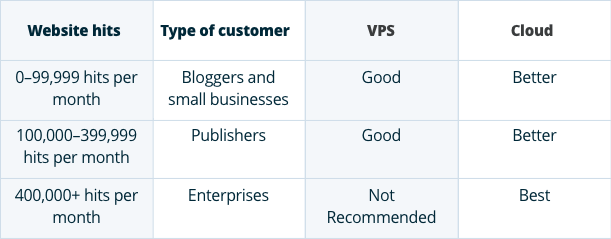
What’s The Difference Between VPS and Cloud Hosting for WordPress?
Regardless of your website’s size, one of the more difficult decisions you’ll make is your choice of web hosting. There are plenty of options, but each will fulfill different needs. What’s more, choosing the wrong type of hosting can negatively impact your site’s performance.
Two options that are a solid choice for most websites are Virtual Private Server (VPS) and cloud hosting. The flexibility and scalability of these types of plans make them useful for websites of any size, meaning they can be used for both personal and business sites.
In this post, we’ve compared VPS vs. cloud hosting performance in a few key areas, including:
- Reliability
- Security
- Customization
- Flexibility
- Cost
We’ll also look at the various features you’ll get with these types of hosting, and examine what kinds of websites each hosting option works best for. Let’s get started!
What Is VPS Hosting for WordPress?
In terms of hardware, VPSs are similar to dedicated physical servers. The difference is that you are technically sharing the physical server with other users. With that being said, VPS hosting virtually segments your part of the server away from everyone else.
Some of the benefits of choosing a VPS solution for your web hosting needs include cost savings, added security, and the freedom to manage your portion of the server. Plus, while other users will also be able to access the server as admins, they can’t access your site’s dashboard or user portal.
What Is WordPress Cloud Hosting?
A cloud host, on the other hand, stores and serves your content on various cloud servers located throughout the world, much like a Content Delivery Network (CDN). Cloud servers can be very economical as well.
Another benefit of using a cloud hosting solution is that it’s both flexible and adaptable. For example, using a virtual server and eliminating a physical server from the equation and connecting your site via a cloud service means that website users in other countries or cities should receive your content as if they were physically close to your cloud server.
What Is the Difference Between VPS and Cloud Hosting for WordPress?
As we mentioned previously, the physical differences between a VPS server and managed cloud hosting come down primarily to the hardware that’s used. However, beyond that, there are functional differences to consider as well.
Reliability
Both hosting options can provide reliable website speed and performance. However, website uptime can still be a concern, especially for VPS users.
For example, because a VPS is only hosted on a single physical server, you could experience website downtime. However, with cloud hosting, your resources are spread across multiple servers for high availability. This means that a single server being down won’t put your site out of commission.
Security
Security is arguably the most important factor to keep in mind when running a website. It’s important to understand that different hosting options will provide you with varying levels of security.
This is where the distinction between cloud hosting vs VPS performance begins to show. With cloud server hosting, your website’s data will often be stored in multiple physical locations. This can make keeping your website optimally secure a little more difficult.
As such, a managed VPS hosting is a better choice if you need top-notch security. This is particularly true if you are running an e-commerce website, or any other type of site that collects private information.
Finally, security is paramount, but the more secure your hosting plan is the less customization flexibility you’ll have. That means you’ll have to consider your needs and how much customization you intend to do.
Customization
Customization – i.e. the configuration and setup of your server – is usually something you’ll need to consider whether you use VPS or cloud hosting. So it’s important to know the limitations of these hosting setups.
Since VPS hosting uses just one server – often giving you admin access at the Operating System (OS) level – customizing this setup is much more flexible than with other solutions. With cloud hosting, your customization options are usually more limited, although not as much as you might imagine. With either option, you’ll still have full access to your server.
Flexibility
Both VPS and cloud hosting offer a fair degree of flexibility, which makes them popular among many website owners. Scalability is also possible with both options, but in different ways. With VPS hosting, you can increase or decrease your resources (such as network bandwidth) as your monthly needs change. With cloud hosting you can do the same, but instantaneously.
As such, VPS hosting is best for websites with a steady stream of monthly visitors. You can always upgrade as necessary on a monthly basis. On the other hand, cloud hosting is useful for websites with less predictable traffic numbers. If your needs ever change, you can instantly increase your resources to meet them.
Cost
Since both hosting options lean towards slightly different pricing setups, it can be difficult to compare them directly.
VPS hosting is often offered at a flat-rate fee, which can increase or decrease based on your predicted needs for the upcoming month. This ‘no surprises’ aspect is a major benefit for small to medium-sized businesses, but it can also mean you’re paying for unused resources if your predictions were too lofty.
In contrast, cloud hosting lets you pay for what you use. Instead of paying a similar rate each month, your bill will fluctuate based on your monthly usage. The benefit is that you pay for only what you’ve used. However, this can mean that heavy traffic months come with unexpectedly hefty bills.
VPS or Cloud Hosting for WordPress: Which Is Right for You?
In short, just about any type of customer – including bloggers, small businesses, publishers, and enterprise-grade sites – can benefit from either VPS or cloud hosting. The crucial thing to consider when making your decision is your monthly traffic levels.
While your specific needs will (of course) vary, the general guidelines are as follows:

When comparing cloud hosting vs. VPS hosting earlier, we considered each of the elements outlined above. Of course, cost will also be a contributing factor, and may affect what you consider to be the better option for your website.
VPS vs. Dedicated Hosting for WordPress
VPS and cloud hosting are two of the most popular options for moderate to large-sized websites. However, another option is dedicated server hosting. The main difference between VPS versus dedicated hosting isn’t the number of servers used (as both use only one). Instead, it’s how the server’s dedicated resources are allocated.
As we mentioned earlier, VPS hosting takes place on a shared server, but with deeper admin privileges. However, a dedicated server contains only one website. This offers the most security and customization possible, and it’s a good choice for high-traffic websites with steady numbers each month.
Ultimately, the hosting type you choose is entirely up to you, whether it’s a shared hosting or a dedicated server. However, it never hurts to have a reliable hosting provider on your side. With this in mind, we recommend that you consider the variety of hosting plans we offer here at WP Engine.
WP Engine offers round-the-clock support and scalable plans that make it possible to find a hosting plan for any website. Best of all, our managed hosting platform means we handle all the back-end details! We hope this helps you narrow down the choice between VPS or cloud hosting versus WordPress hosting.
Find Your Best WordPress Cloud Hosting With WP Engine
Our WordPress hosting plans provide you with a team of WordPress professionals on your side. We provide best-in-class managed hosting for WordPress that delivers tight security, unmatched speed, high availability, and massive scalability backed by the service and support of an expert team of WordPress specialists.
Not only will you have access to dedicated support technicians, but also to our WordPress resources and innovative digital platform as well. Get started with one of our dedicated hosting service plans for your next project!
